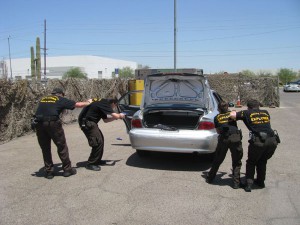Can the Police Answer Your Phone and Impersonate You?
Andres Lopez-Cruz was in big trouble when a pair of border patrol agents stopped his car in 2011. Lopez was driving through Highway 80 when the agents stopped him. The agents pulled Lopez over because they believed Lopez was tapping his brakes too much. During questioning, one of the agents asked to look at and search two cell phones in the back seat. Lopez claimed that the car and the phones belonged to a friend, but Lopez gave the agent permission to search the phones anyway.

While looking through the phone, a call came. Rather than inform Lopez that he had a caller, the agent decided to answer the call in Lopez’s place. A woman asked the agent “how many did you pick up?” The agent replied “None.” The woman hung up and a second caller asked “How are things going?” The agent said “I didn’t pick anyone up; there are too many border patrol agents in the area.” The woman called again, and under the impression that the agent was Lopez, instructed the agent to pick up a couple of undocumented immigrants from an address in San Diego.
The agents arrested Lopez and the two illegal immigrants waiting for Lopez in San Diego. Lopez argued that his 4th Amendment right against unreasonable search and seizure had been violated. The government offered three reasons why the impersonation should be legal. First, Lopez disclaimed ownership over the phones and thus forfeited any expectation of privacy. Second, Lopez had given the agent permission to answer the phones when Lopez consented to the phone search. According to the government, there is no difference between answering an incoming phone call and reading an incoming text message. Finally, the government contended that Lopez’s consent was the equivalent of a search warrant. A search warrant would have allowed the agents to receive the incoming calls without violating the 4th Amendment.
The Ninth Circuit panel ruled 3-0 that the phone calls must be excluded from trial. The judges held that Lopez had an expectation of privacy because he had possession of the phones and had the right to exclude the officers from searching the phones. They also ruled that Lopez’s consent to search the phones “did not extend to answering incoming calls.” The agents exceeded the scope of Lopez’s consent. Finally, the three judge panel rejected the idea that consent could be a substitute for a court-issued search warrant.
So what is the take away from this case? If a driver denies police officers permission to search a vehicle, the prosecutor has to prove that the police had probable cause to search the vehicle. Prosecutors have to prove that a criminal defendant is “guilty beyond a reasonable doubt” in order to prevail. Although adding another element of proof to a prosecutor’s case might not seem like much, that extra requirement does require more evidence and will burden the government’s ability to harass drivers on the road.


Comments